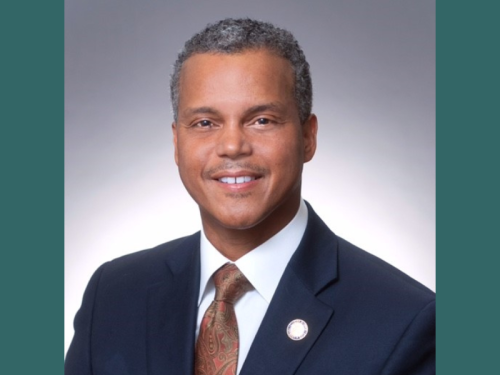Albert Sam trying to help improve 'an already exceptional school'

From his days on the football field at Brother Martin High School in New Orleans to his success as a prominent vascular surgeon, Albert Sam MD (PHTM *10) was always at the head of the pack, but it was his time at Tulane that made him a leader.
Sam’s career in medicine came about in a roundabout way. A talented young athlete, he was hopeful his future was in the football. “Well, God had a different plan because I stopped growing,” he recalls.
Eminently practical even at such a young age, he assessed his chances and hit the books hard. He went on to Morehouse College, accepting a place in a summer program for premedical and engineering students before his freshman year. It was there he discovered that the competitive spirit that drove him on the gridiron transferred to the classroom. Sam thrived and went on to Duke University for his medical degree, embarking on the path to become a surgeon.
“Surgery for me was just a natural fit because coming from athletics I had the whole mentality about how it takes a team to be successful, and that’s so true with surgery,” says Sam.
He followed up his time at Duke with a general surgery residency at the University of Illinois and a vascular surgery residency at Northwestern University before joining a practice in Baton Rouge. A gifted surgeon with a curious mind, Sam was increasingly drawn to understanding the business side of running a practice.
For Sam, understanding the business of medicine elevates the ability to practice medicine by removing obstacles. “[Early on] you don’t really spend a lot of time thinking about the business side of the practice and all of the things that go into successfully having that in place so that you can practice medicine and practice surgery without other things getting in the way,” he says.
That blend of the intellectually curious and the eminently practical brought him to Tulane University School of Public Health and Tropical Medicine (SPHTM) where he enrolled in the Master of Medical Management (MMM) program. It was a gamechanger in every sense of the word — and sparked a lifelong connection with SPHTM.
“Whoever embarks upon [the MMM program], it fundamentally changes who you are. Before you go, for the most part, you’re strictly a clinician. You have a lot of responsibility for leadership, but you really don’t know how to lead.
“One of the things that the Tulane MMM did is it made the study of leadership like any other subject you’d study in school, and it broke it down into components,” says Sam.
Sam used his practice in Baton Rouge as a case study, eagerly uncovering methods for innovation and efficiency. But he also uncovered his partners’ reluctance to change.
The next step: Tulane of course. Sam became the chief of vascular surgery at Tulane University School of Medicine. It was a wonderful period of growth for Sam and for Tulane as he embodied the leadership skills that he had learned at SPHTM.
“It really exponentially grew my abilities to handle leadership responsibilities on a much higher level than previously — none of which could have even embarked upon without the MMM,” Sam recalls.
Since then, Sam has shared his talents across the country, working as the director of medical services at Middlesex Health and as an attending vascular surgeon at The Vascular Experts, both in Connecticut. In 2020 Sam joined Inova Health System in Falls Church, Virginia. As a vascular surgeon, he is also responsible for expanding Inova’s vascular surgical presence in the Washington DC-adjacent area and expanding office-based interventions system wide.
But he has never forgotten the life-changing experience that SPHTM offered and the committed professors he worked alongside. He is a member of the Public Health Dean’s Council and is excited about “trying to help navigate a strategy moving forward to help improve an already exceptional school.”
As the school reinvigorates the MMM program, Sam is excited to share his insights. “I can understand exactly the value it brings in real time because I’ve lived it. I can be an advocate for the MMM program and let [Dean LaVeist] know the pros, the cons — everything.”
Sam matches his commitment of service with his philanthropy, supporting the Dean’s Excellence Fund at SPHTM as well. He chose the fund in order to give Dean Thomas LaVeist maximum flexibility to pursue priorities. “You want to give the leaders of institutions the flexibility to put funds where they’re needed the most, because one need that is here today may be subservient to another need that’s due tomorrow.”
Of the MMM program, Sam concludes, “The beauty of the MMM program is that most importantly we have to lead as clinicians. What we have to be in tune with is that at the end of the day medicine is about people, and it is about the business of people when people are at their most vulnerable.”
